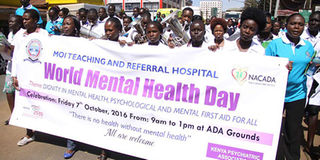Take care of our veterans or regret later

Moi Teaching and Referral Hospital workers and members of the public raise awareness about mental health, in a procession in Eldoret town on October 7, 2016. PHOTO | FILE | NATION MEDIA GROUP
What you need to know:
- It is time for us to think more seriously about these men and women who put their lives on the line in order to ensure that the rest of us are safe.
- It is therefore gratifying to note that the police service recently indicated their intention to recruit mental health staff to begin assessing and addressing their urgent mental health needs.
Twelve years ago, we conducted a study on the occurrence of posttraumatic stress disorder (PTSD) among survivors of the Mau Mau concentration camps living around Nairobi.
PTSD is a condition that arises after exposure to potentially traumatic events. It is characterised by numerous disabling symptoms including difficulties with sleep, mood changes and anxiety, constantly reliving the traumatic event, and erratic behaviour.
We eventually published the findings of our work in the East African Medical Journal, with the main findings being the very high prevalence of PTSD in this group of veterans and the suffering they had gone through in the 50-odd years since the end of the Emergency.
The tragedy with this situation is that little or no effort had been made to provide some sort of support for these veterans, and as a result they suffered significant dysfunction that affected their relationships and their ability to function socially and occupationally.
Many were poor and lived in squalid conditions, and their families survived by scrounging on the edges of the economy.
CRIME
Later, when there was an upsurge of gang crime and eventual political violence, there were suggestions that the gangs were made up mostly of the offspring of these neglected veterans, upset that they continued to suffer despite the documented contribution of their parents to the freedom struggle.
We must remember that in central Kenya the theme of the struggle was “land and freedom”, and the insurrection was intended to drive the colonialist out of the highly productive lands that natives considered to be their birthright.
At the conclusion of our work, we recommended the establishment of a Veterans’ Service to address the problems faced by these and other veterans of armed service.
Over a dozen years later this recommendation remains on the shelves of the University of Nairobi library, and in the archives of the journal that published it. We still remain hopeful it will be implemented.
LINDA NCHI
Several years after we published our work, our military got actively involved in the war in Somalia after persistent attacks by Al-Shabaab terrorists.
It must be remembered that posttraumatic stress disorder was first properly characterised among American veterans of the Vietnam War, and to this day military psychiatry leads the way in research and care for this debilitating condition.
The foray of our military into Somalia therefore increased the probability of our soldiers and their loved ones suffering from this condition and other mental disorders triggered by exposure to the traumatic events characteristic of a war zone.
It is time, in my view, for us to think more seriously about these men and women who put their lives on the line in order to ensure that the rest of us are safe.
HEALTH EXPERTS
Lessons from elsewhere, and from our own history, indicate that we shall pay a very heavy price in the near future if we continue to neglect the health of our veterans and serving security officers.
It is therefore gratifying to note that the police service recently indicated their intention to recruit mental health staff to begin assessing and addressing their urgent mental health needs.
We still continue to hope that the government will consider establishing a specialised service to take care of the psychological and social needs of our uniformed officers and veterans.
Atwoli is Associate Professor of Psychiatry and Dean, Moi University School of Medicine; [email protected]





